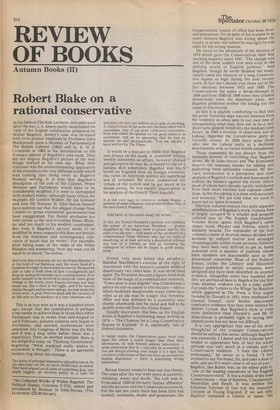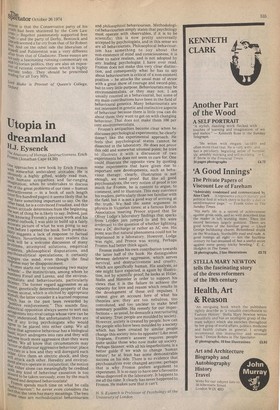Autumn Books (II)
Robert Blake on a rational conservative
In his famous Chichele Lectures, delivered soon after the war, L. S. Amery partly demolished the view of the English constitution presented by Walter Bagehot. Amery's case was re-stated with even greater emphasis by Professor John Mackintosh (now a Member of Parliament) in The British Cabinet (1962) and by R. H. S. Crossman in 1963 in his introduction to the Fontana edition of Bagehot's own book. They did not dispute Bagehot's picture of the way things worked in his own day. What they criticised was the undiscriminating application of his theories to the very different world which was coming into being even as Bagehot finished writing. It is true that Bagehot's description of the role of the Cabinet, Prime Minister and Parliament would have to be considerably modified if it were to correspond with modern reality, although many critics, for example, Mr Gordon Walker, Mr Ian Gilmour and now Mr Norman St John-Stevas himself have pointed out that the alleged change from Cabinet to 'prime ministerial' government has been exaggerated. The theory attributes too little power to the mid-Victorian Prime Minister and too much to his modern counterpart. But even if Bagehot's picture needs to be modified in some respects this does, not detract from the freshness and contemporary relevance of much that he wrote.* For example, after listing some of the tasks of the Prime Minister and wondering "how any man can be equal to so much," he writes:
And even this is scarcely all, for the Prime Minister is at the head of our business, and, like every head of a business he ought to have mind in reserve. He must be able to take a fresh view of new contingencies and keep an animated curiosity as to coming events. If he suffer himself to be involved in minutiae, some great change in the world, some Franco German war may break out, like a thief in the night, and if he has no elastic thought and no spare energy, he may make the worst error. A great Premier must add the vivacity of an idle man to the assiduity of a very laborious one.
This is as true now as it was a hundred years ago, except that the combination is perhaps even harder to achieve than in those days when Parliament was in recess from mid-August to early February, autumn cabinets only began in November, and summit conferences were unknown (the Congress of Berlin was the first and it was a long while before there was a repetition). Then, as another example there is his delightful essay on Thinking Government' beginning "What mankind really wishes to economise is thought." There is an agreeable modern ring about this passage
The laxity of principle imputed to old politicians is, by the time they are old, as much intellectual as moral. They have argued on all sides of everything [e.g., one might suggest, an incomes policy as a cure for
*The Collected Works of Walter Bagehot. The Political Essays, Volumes V-VIII, edited and introduced by Norman St John-Stevas, (The Economist £25.00 the set). inflation] till they can believe on no side of anything. A characteristic of the same sort has been observed in journalism. One of our most celebrated contemporaries was asked his opinion on ten great subjects in succession, and on its appearing that he had no opinion, he said apologetically, 'You see, ma'am, I have written for The Times.'
It would be a mistake to think that Bagehot was always on the mark. A journalist writing weekly comments on affairs, however shrewd and perceptive he may be, is bound to slip .on a banana skin sometimes. Bagehot was much better on England than on foreign countries. His views on American politics are superficial and ill informed. He never understood the virtues of the system and he got many of its details wrong. He was equally impercipient in his analysis of the French Third Republic.
ir is not very easy to conceive, outside Russia, a position of more influence and grandeur than that of the new French President.
And later in the same essay he wrote: In fact, the French President's position will combine the power of an American President — greatly magnified by the longer term of power and by the right of re-election — with many of the attributes of a constitutional Prime Minister who has the right of dissolving, or at least advising a dissolution without any fear of a refusal, as well as choosing the colleagues by whose aid he hopes to guide parliament.
Events very soon belied this prophecy. Marshal MacMahon's exercise of the right of dissolution with the Senate's consent misfired disastrously two years later. It was never tried again. The President became a figure-head with none of the magic of a constitutional monarch. 'Votez pour le plus stupide" was Clemenceau's advice on one occasion to the electors — advice which backfired disagreeably many years later when as an old man he sought that honorific office and was defeated by a nonentity who shortly afterwards lost his mind and had to be quietly removed from the ElYsee Palace.
Equally inaccurate, this time on the English scene, is Bagehot's fascinating essay written in 1874 — The Chances for a Long ConserVative Regime in England.' It is, admittedly, full of shrewd comments.
In happy states, the Conservative party must rule upon the whole a much longer time than their adversaries. In well framed polities innovation — great innovation that is — can only be occasional. If you are always altering your house it is a sign that you have a bad house or that you have an excessively restless disposition — there is something wrong somewhere.
Recent history seems to bear out this theory. The years after the war were years of austerity, rationing, worry and doubt. The Left was in. From about 1950 till the early 'sixties 'affluence' was the keynote and the Conservatives were in. For the last ten years there has been little but turmoil, confusion, doubt and pessimism; the Conservatives' tenure of office has been short and precarious. Yet in spite of his acumen in so many matters Bagehot was wrong about the future, or at any rate where he was right he was right for the wrong reasons.
He wrote in the aftermath of the election of 1874 which gave the Conservatives their first working majority since 1841: "The change was one of the most sudden ever seen even in the shifting world of English politics." And Bagehot, though he never finished the essay, clearly rated the chances of a long Conservative regime as high during the next twenty years. In fact the Liberals won three out of the five elections between 1875 and 1895. The Conservatives did make a break-through in 1886 and from 1895 till 1906 when they crashed disastrously were the dominant party, but Bagehot predicted neither the timing nor the cause of this revival.
In fact it is slightly comforting to find that the great Victorian sage was not immune from the tendency so often seen in our own time of extrapolating what may turn out to be a very short term present trend into the medium term future. In 1945 a number of observers, not all Labour, regarded the Conservative party as virtually extinct. In 1959 there were those who saw the Labour party as a declining anachronism with no future worth considering.
Those comments do not detract from the immense interest of everything that Bagehot wrote. Mr St John-Stevas and The Economist deserve the warmest thanks for editing and publishing these admirable volumes. Mr Stevas's introduction is a perceptive and clear analysis of Bagehot's outlook and does much to redress the balance against his recent critics, most of whom have already tacitly withdrawn from their more extreme and exposed conditions. Asfor the editing it is done with accuracy and economy. We are told what we need to know but no space is wasted. The four volumes contain two quite separate manifestations of Bagehot's work. Volume Five is largely occupied by a reliable and properlY collated text of The English Constitution. Volume Seven opens with Bagehot's other classic work. Physics and Politics, which is similarly treated. The remainder of the four volumes consist of shortish essays divided into sections by subject matter and arranged chronologically within those sections. Hitherto they have been very difficult to get at, being scattered over a number of journals whose back numbers are inaccessible save to the determined researcher. Most of the Political Essays, unlike the Literary and Historical Essays published in earlier volumes, were unsigned and have been identified on internal evidence. Altogether some two hundred and fifty are attributed here to Bagehot for the first time. Internal evidence can be a risky guide. For years the 'Letters to the Whigs' by Manilius which appeared in The Press, a Tory organ founded by Disraeli in 1853, were attributed to Disraeli himself: until Buckle discovered conclusive evidence that they were written by Bulwer Lytton. But Bagehot's style is even more distinctive than Disraeli's, and Mr St John-Stevas is probably right in saying that identification has not been too difficult.
It is very appropriate that one of the most thoughtful of the younger Conservatives should be editing this series. Although Bagehot was nominally a Liberal and the Liberals have tended to appropriate him, in fact his whole attitude was very much in a certain sort of Conservative tradition. "I hate the Liberal enthusiasts," he wrote to a friend, "I feel inclined to say `Go home, Sir, and take a dose of, salts, and see if it won't clear it all out of you'. Bagehot, like Burke, was, as the editor puts it "one of the leading expositors of the English Conservative mind." It was a middle of the road Conservatism — that of Baldwin, Chamberlain, Macmillan and Heath. It was neither the Eldonian Toryism of fear nor the romantic Toryism of Young England. If we ask why Bagehot remained a Liberal in name, the answer is that the Conservative party of his Yo.uth had been shattered by the Corn Law terh,sjs — Bagehot passionately supported free de — and the party of Derby, Bentinck and sraeli
seemed a far cry from that of Sir Robert
?Reel, And on the other side the liberalism of us's. ell and Palmerston was a very different affair from that of Gladstone. These essays are Ot Only a fascinating running commentary on lilicl-Victorian politics, they are also an exposp.„'hin of rational conservatism which is highly 2:`'evant today. They should be prescribed 'eading for all Tory MPs.
Le„ IV Blake uxford
is Provost of Queen's College,











































 Previous page
Previous page